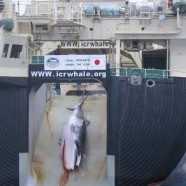Japan Strikes Back
Information note N°4
Whales at the International Court of Justice
The Hague, The Netherlands, 1st hearing of Japan, July 2nd – July 3rd
Japan, a country surrounded by sea, states that they “would be the last to misuse whales as resources because [they] know [they] benefit from the fruits of the sea”. Japan goes back in time explaining that they joined the International Whaling Commission (IWC) in 1951 “at a time when, amidst the devastation of war, whale meat helped prevent starvation” for a country with scarce land resources. They go even further back in time and point at the irony of history as it was whaling that forced them to interact with the international community after three hundred years of isolation. Japan stated that in the 19th century, “major maritime powers engaged in massive scale whaling demanded that Japan open up its ports to supply their whalers”. And it is this very subject, whaling, which today puts in question Japan’s compliance with the international community and international law and has brought them, for the first time, before the International Court of Justice.
Japanese “Scientific Whaling” by its Right Name is “Commercial Whaling”
Information note n°3
Whales at the International Court of Justice
The Hague, The Netherlands, 1st hearing of Australia, June 26th – June 28th
In his opening statement for Australia, Mr Campbell projected an image of a Japanese vessel with “Legal Research under the ICRW”* painted on the side and yet another whale lying dead on the slipway. For Australia, this is the image and language of a country trying to convince itself that they are contributing to science and thereby respecting the law. The international community and more specifically the international scientific community is not convinced.
Japanese “Scientific Whaling” by its Right Name is “Commercial Whaling”
Information note N°3
Whales at the International Court of Justice
The Hague, The Netherlands, 1st hearing of Australia, June 26th – June 28th
In his opening statement for Australia, Mr Campbell projected an image of a Japanese vessel with “Legal Research under the ICRW”* painted on the side and yet another whale lying dead on the slipway. For Australia, this is the image and language of a country trying to convince itself that they are contributing to science and thereby respecting the law. The international community and more specifically the international scientific community is not convinced.
The End of the Japanese Fairy Tale
Information note N°2
Whales at the International Court of Justice
The Hague, The Netherlands, 1st hearing of Australia, June 26th – June 28th
Impressions on the Australian point of view during the hearings from June 26th 27th and 28th 2013
During the first three days of the Australia v. Japan court case at the International Court of Justice, Australia has been presenting arguments stating them loud and clear to wake Japan up from over twenty years’ of sleep. Japan, indeed, had fallen into a deep legal sleep like a “Sleeping Beauty”, and the international community should not wait until a “beautiful white whale” comes along to wake them up. Such was the metaphor used by Mme Boisson De Chazournes when she presented the court with Japan’s interpretation on the wording of the text of the International Whaling Commission (IWC). She stated that contrary to Japan’s reading of the 1946 IWC, the Convention enforces whale conservation and does not provide for the reinforcement of commercial whaling. As to the breaching of international law, and the continuation of whaling by Japan, Australia’s arguments are threefold. Firstly, the use of whale catchers and factory ships, secondly, a clear breaching of the 1986 moratorium on commercial whaling and thirdly, a violation of the Southern Ocean Sanctuary specifically with regard to fin whale catches.
The End of the Japanese Fairy Tale
Information note n°2
Whales at the International Court of Justice
The Hague, The Netherlands, 1st hearing of Australia, June 26th – June 28th
Impressions on the Australian point of view during the hearings from June 26th 27th and 28th 2013
During the first three days of the Australia v. Japan court case at the International Court of Justice, Australia has been presenting arguments stating them loud and clear to wake Japan up from over twenty years’ of sleep. Japan, indeed, had fallen into a deep legal sleep like a “Sleeping Beauty”, and the international community should not wait until a “beautiful white whale” comes along to wake them up. Such was the metaphor used by Mme Boisson De Chazournes when she presented the court with Japan’s interpretation on the wording of the text of the International Whaling Commission (IWC). She stated that contrary to Japan’s reading of the 1946 IWC, the Convention enforces whale conservation and does not provide for the reinforcement of commercial whaling. As to the breaching of international law, and the continuation of whaling by Japan, Australia’s arguments are threefold. Firstly, the use of whale catchers and factory ships, secondly, a clear breaching of the 1986 moratorium on commercial whaling and thirdly, a violation of the Southern Ocean Sanctuary specifically with regard to fin whale catches.









